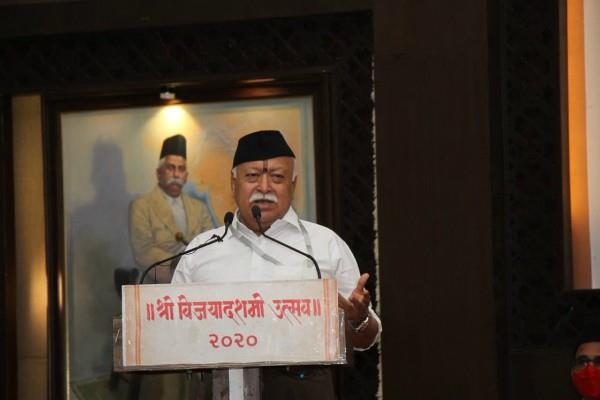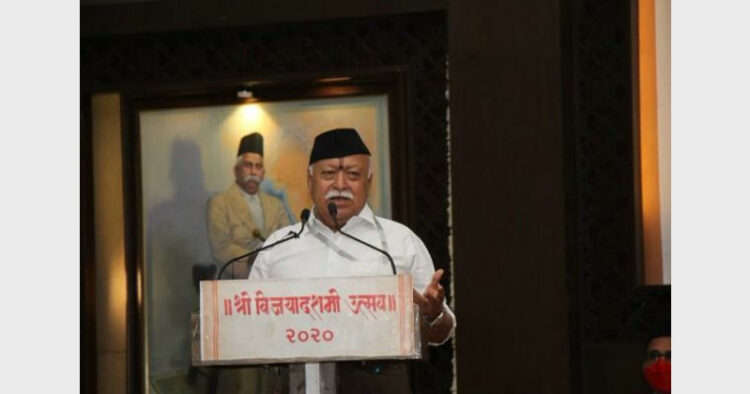
Excerpts from the address by Param Poojaniya Sarsanghchalak Dr Mohan ji Bhagwat on the occasion of Sri Vijayadashami Utsav 2020 (Sunday, October 25, 2020)
The philosophy of ‘Swadeshi’ has trumped once again. It is time to redefine these adages in view of the current Bhartiya context and to rebuild paths that will lead us back to our time-tested values and traditions.
Poet laureate, Shri Rabindra Nath Thakur also clearly emphasised a philosophical foundation for the Bharatiya revival based on this very concept in his essay ‘Swadeshi Samaj.’ Shri Aurobindo proclaimed it in his Uttarpara address. The introspections and contemplations conducted by our society after 1857 and the experiences of the exercises conducted by several national bodies are encased in the Preamble to our Constitution which embodies the same spirit of Bharat.
The spirit or ‘swa’ should be the compass directing our intellectual brainstorming and plans of action. It should be the light that illuminates the directions, aspirations and expectations of our country’s collective consciousness. The results of our efforts in the physical plane and their consequences should be in accordance with this principle. Then and only then will Bharat qualify as self – reliant.
Places for production, the workforce that is involved in the production process, economic benefits emanating from sales of the production and the rights of production must be in our national control. But this alone does not qualify as Swadeshi methodology.
Shri Vinoba Bhave ji identified a combination of self-reliance and non-violence as Swadeshi. Late Shri Dattopant Thengadi ji claimed Swadeshi cuts beyond goods and services and stands for attaining a position of international cooperation by achieving national self-reliance, sovereignty and parity.
So to achieve financial independence in the future and attain a position of international cooperation we are open to foreign investors and give relaxations to companies offering newer technologies, provided they engage on our terms and mutually agreeable conditions. But such a decision has to be based on mutual consensus.
In self-reliance, dependence on self is intended. Our vision decides our destination and our path. Even we attain a prime position by following the same wasteful exertions that the rest of the world is after, that will certainly be a courageous victory. But it will be in the absence of the spirit and participation of the ‘Swa’(Self).
Some positive steps in the direction of assimilating this ‘swa’ in our economic, agriculture, labour, manufacturing and education policy have been taken.
A new education policy formed on the basis of extensive deliberations and dialogue has been declared and launched. Along with the entire educational field, the Sangh has also welcomed it.
“Vocal for local” is a great start in the exploration of the possibilities of Swadeshi. But, for these initiatives to be successfully implemented the process will have to be watched and monitored keenly to the finish. Therefore given these wide-ranging perspectives we will have to imbibe this spirit of ‘swa’ or self, only then we can move forward in the right direction.
The spirit of oneness is critical to actualising self-reliance in various aspects of life. Self-reliance then essentially implies overall well-being and upliftment of the whole nation through coordinated efforts and cooperation with each other, akin to interdependent organs of one body.
A policy-making process where all concerned people and parties discuss and deliberate extensively and draw consentient conclusions fosters the spirit of oneness and trust among all. Open dialogue with all, drawing consensus through discussion, ensuring cooperation and resultant trust – this is the prescribed method for securing credibility and eminence among one’s family and community.
Prompt implementation of mutually agreed policies does not require massive changes and boosts the environment of cooperation and coordination. Remaining alert and exercising total control over the implementation of proposed policies until the end-point is significant.














Comments